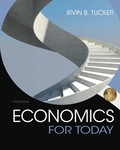
The three motives of
Explanation of Solution
People hold money mainly for transaction purpose, precautionary purpose, and speculative purpose. The amount of holding money depends not only on the rate of interest but also on the
Option (a):
The demand for money for the purpose of three motives (transaction motive, precautionary motive, and speculative motive) is positively related with the income. When the income level increases, the transaction demand for money, precautionary demand for money, and speculative demand for money also increase and vice versa.
Option (b):
The demand for money for transaction motive and precautionary motive is positively related with the interest rate. Speculative motive is negatively related with the interest rate. The purchase of bonds and other assets are related with the transaction motive. Thus, decreasing the interest rate on bonds and other assets leads to reduce the demand for money to spend on (purchase) bonds and other assets.
Option (c):
When an automated teller machine is installed near a person, the demand for holding money for transaction and precautionary motive decreases because money is available at any time and hence, there is no necessity to keep money and also, the person gets an amount of interest.
Option (d):
Demand for money and
Option (e):
People always hold money mainly for transaction motive, precautionary motive, and speculative motive. When a person gets income on weekly basis instead of monthly basis, then it is not necessary to keep more money. Thus, the transaction demand for money and precautionary demand for money decrease.
Demand for money: Demand for money refers to the amount of money that households and firms desire to hold at different nominal interest rates.
Opportunity cost: Opportunity cost refers to the benefits given up in the process of obtaining some other benefits.
Transaction demand for money: Transaction demand for money is the holding of money to meet the everyday expenses of a person.
Precautionary demand for money: Precautionary demand for money is the amount of money held by a person for contingency purpose.
Speculative demand for money: Speculative demand for money is the money held by people to take advantage from change in the price of bonds and other assets.
Want to see more full solutions like this?
Chapter 26 Solutions
EBK ECONOMICS FOR TODAY
- how commond economies relate to principle Of Economics ?arrow_forwardCritically analyse the five (5) characteristics of Ubuntu and provide examples of how they apply to the National Health Insurance (NHI) in South Africa.arrow_forwardCritically analyse the five (5) characteristics of Ubuntu and provide examples of how they apply to the National Health Insurance (NHI) in South Africa.arrow_forward
- Outline the nine (9) consumer rights as specified in the Consumer Rights Act in South Africa.arrow_forwardIn what ways could you show the attractiveness of Philippines in the form of videos/campaigns to foreign investors? Cite 10 examples.arrow_forwardExplain the following terms and provide an example for each term: • Corruption • Fraud • Briberyarrow_forward
- In what ways could you show the attractiveness of a country in the form of videos/campaigns?arrow_forwardWith the VBS scenario in mind, debate with your own words the view that stakeholders are the primary reason why business ethics must be implemented.arrow_forwardThe unethical decisions taken by the VBS management affected the lives of many of their clients who trusted their business and services You are appointed as an ethics officer at Tyme Bank. Advise the management regarding the role of legislation in South Africa in providing the legal framework for business operations.arrow_forward



 Economics (MindTap Course List)EconomicsISBN:9781337617383Author:Roger A. ArnoldPublisher:Cengage Learning
Economics (MindTap Course List)EconomicsISBN:9781337617383Author:Roger A. ArnoldPublisher:Cengage Learning






